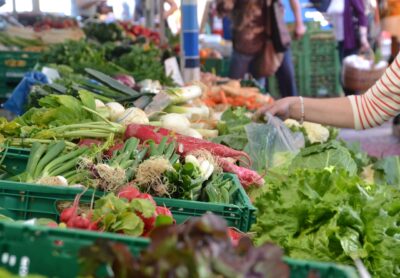Week 4 on More Farmers More Food looked at UK vegetable and fruit farming.
In this Article...
By eating locally produced seasonal fruit and veg we can support our local farmers and improve our diets.
Vegetable production operations range from small patches of crops producing food for family use to highly organised and mechanised big scale farms. Somewhere in the middle are market gardens and small farms that produce assorted vegetables for local markets, direct gate sales and veg box schemes. Selling produce at a market is a popular choice for farmers who enjoy working directly with the public. It can also help to advertise an existing farm shop or direct online sales orders.
There were about 650 farmers markets in the UK at the last count in 2018. The most important rule is that the smallholder must have produced the food they sell and it be within a short radius locally. Selling farm produce direct to consumers is a great way to cut out the middle man. As consumers we must choose to support them to get more food grown and purchased from UK fields and small farms.
Big scale vegetable farming requires attention to all production operations including insect, disease and weed control. This usually involves using a lot of chemicals, conformity and produces cheap and less nutrient dense food. Whilst we understand that food needs to be produced for the population, it is clear that it cannot be achieved in the highly industrial and damaging manner it has been doing in the last few decades. We have increasing evidence that it has caused soil degradation and environmental pollution. So now we are calling for a more holistic approach to farming for the long term sustainability of our food production methods.
Did you know that in 2022 the UK produced around 2.4m tonnes of vegetables and 652,000 tonnes of fruit. With a value of £1.8bn and £1bn respectively. BUT, it also imported £2.7bn worth of vegetables and £3.9bn worth of fruit!
At the moment only 55% of vegetables and 17% of fruit consumed in the UK are grown here. It’s time to grow your own, support a local grower or small farm and definitely buy British! Once the demand goes up then more will be produced.
In recent years there has been a growing interest in organic vegetable farming which prioritises natural methods and avoids synthetic chemicals, promoting soil health and biodiversity and the demand for fresh and locally sourced vegetables has led to the rise in farmer’s markets, community gardens and CSA (community supported agriculture) projects. These initiatives connect farmers with consumers to support a closer relationship with those who grow food and those who consume it. This interaction benefits the local economy and ensures transparency in the food supply chain as surely it’s better to know where your food comes from.
We looked at the importance of incorporating a diet rich in vegetable nutrition and what advantages vegetables offer to our health. Fresh vegetables contain nearly all the essential nutrients our body needs, resulting in significant health benefits. They serve as a rich source of vitamins, minerals, antioxidants and dietary fibre. Antioxidants are valuable phytochemical compounds and serve a dual purpose. Firstly they shield the body from oxidative stress, diseases and cancer and secondly, they bolster the body’s immunity enabling it to combat health changes effectively. Vegetables are full of both soluble and non soluble dietary fibres collectively known as non starch polysaccharides (NSP) such as cellulose, mucilage, hemi cellulose, gums and pectin among others. These absorb excess water in the colon, maintain optimal moisture levels in faecal matter and facilitate its smooth passage out of the body.
A healthy balanced diet should be rich in vegetables and fruits. Each one provides a unique blend of healthy properties. You’ll gain more health benefits by varying your vegetables by colour, texture and flavour at every meal.
Seasonal eating is as old as time itself. People ate whatever was growing in their gardens when it was ready to be harvested.
The benefits of eating seasonally are:
– Seasonal produce doesn’t have to travel far if it’s grown locally and it’s better to eat seasonal food grown in your local area or country
– It’s tastier, fresher and more nutrient dense when harvested at peak ripeness
– It adds variety to your diet and can offer a better diversity of vitamins and minerals throughout the year
– Seasonal food helps the body deal with changing weather conditions
– It is sustainable and eco friendly and part of a healthy eating pattern
– It makes you appreciate the food as it comes into season as everything is not available instantly throughout the year
– It teaches you patience
– It tastes better!
Supermarkets discourage seasonal eating by importing produce so everything is available all year round and some would say that this is morally and unethically wrong.
By growing your own or supporting small scale farms, veg box schemes, local growers or UK grown produce, you are doing the best for your body, the rhythms of nature, your local economy and your country.
But in the meantime on a smaller scale you could:
🌱plant a tree
🌱use rainwater from a water butt for your plants
🌱go peat free and make your own compost
🌱plant for pollinators
🌱grow your own cut flowers
🌱use the no dig method of gardening and grow your own food
🌱eat more home grown, UK produced, local and seasonal fruit and vegetables
🌱go organic
🌱plant native plants
🌱plant perennials
🌱save your own seeds



